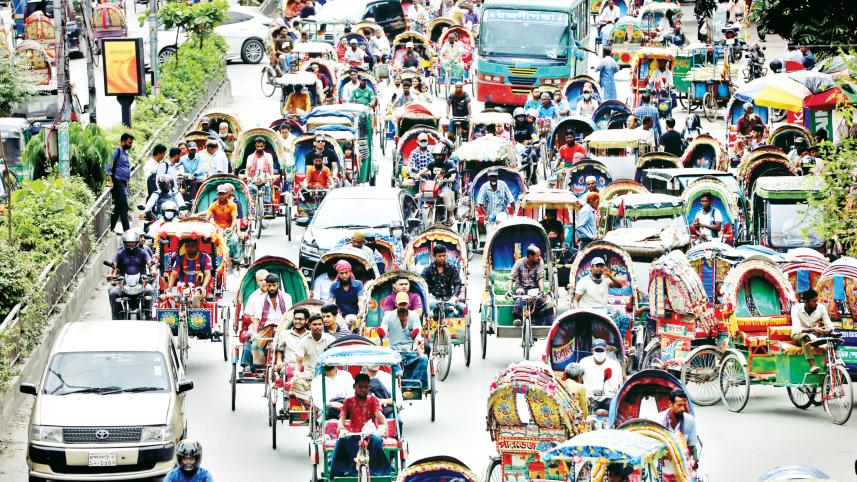Regulating battery-run rickshaws

Battery-run rickshaws are the blind spot for the laws governing the streets in Bangladesh, and we might be suffering all the more for it. In this piece, I will attempt to discuss the relevant legal framework and give my views on what ought to be done.
In July 2014, a High Court Division (HCD) bench passed an order to ban the use of battery-run rickshaws, also known as e-rickshaws, countrywide. Since then, there have been multiple pushes to regulate the use of such vehicles. Early last year, the then government announced that laws would be enacted to govern e-rickshaws afford them legal status. Post uprising, it again came to the front as an issue. Notably, the HCD, in November 2024, directed authorities to stop the operation of battery-operated rickshaws in Dhaka within three days. Needless to say, this was ineffective, and the prevalence of battery-run rickshaws remained the same since.
The reaction to the ban has been mixed, with some holding sympathetic views towards the use of battery-run rickshaws, while others agree with the decision. Given the fact that the authorities are actively attempting to reduce the use of these vehicles, the dependence thousands of people have on battery-run rickshaws (both as a means of transport and livelihood), the policies in this regard must be evaluated.
The government is in a strange situation regarding e-rickshaws. The Bangladesh Road Transport Authority (BRTA) has endorsed multiple regulations and guidelines on the usage of pedal rickshaws and CNGs, but given that the BRTC does not recognise e-rickshaws, they do not have any regulation on them. This lapse in policy and regulation has led to underground garages manufacturing e-rickshaws with no regard as to safety. Governments have tried and failed multiple times trying to get rid of these vehicles. However, massive protests erupted each time bans were placed on these e-rickshaws.
E-rickshaws face stern opposition by many due to the frequent accidents caused by sudden speed ups and a lack of trained rickshaw puller. These e-rickshaws travel at unreasonable speeds estimated to be up to 40 km/h, leading to deaths and injuries during accidents, with very few and inadequate measures being put in place to prevent this. The e-rickshaws even have effects on the energy sector as well as the environment. Most e-rickshaws are powered by lead-acid batteries, and due to the unregulated nature of these vehicles, battery disposal and other waste management are not done in appropriate manner. In addition, different reports suggest that around 90% of garages use illegal electricity connections. It is evident that these systematic issues need to be addressed through strict legislation.
Based on past experiences, it is safe to say that banning e-rickshaws and expecting them to be effectively gone is simply not workable in a city such as Dhaka. The dependence the people have on these vehicles must first be reduced. Part of why such dependence has arisen is due to the lack of accessible and convenient public transportion. Therefore, it is imperative that laws such as the Bangladesh Road Transport Act, 2018 (This Act oversees the regulation of road safety, addressing traffic violations and vehicle fitness, among other things), not only create regulations but also, acknowledge the existence of e-rickshaws. Speed limits, the number of passengers, and the structure of the rickshaw are some of the aspects that need to be regulated.
The authorities have attempted to control the use of these e-rickshaws by methods such as the destruction of apprehended vehicles. However, a more pragmatic approach has been recently approved by the North and South City Corporations, which approved the use of special slow-speed e-rickshaws created by BUET with hope that the existing e-rickshaws will be phased out over time. The project sounds quite optimistic, but critics severely question how this would, in fact, compete with illicit e-rickshaws. A policy titled 'Three-Wheeled Low-Speed Battery-Operated Rickshaw (e-rickshaw) Operation Regulations, 2025' has also been finalised recently, which allows e-rickshaws to only run on specific roads designated by the city corporations and the traffic police.
The success of this project and others similar to this remains to be seen. However, one thing is certain, and it is that legislation and policy building are necessary to control e-rickshaws. In my opinion, eradicating e-rickshaws wholly is not the solution Dhaka needs right now. Instead, creating more citizen-focused practical legislation should be the top priority for the authorities. Legally recognising e-rickshaws would allow the government to set safety standards, develop guidelines that protect the environment and ensure training of the drivers. Without legal regulation, these vehicles will continue to pose a threat to the safety of millions and continue to burden an already tumultuous traffic situation.
The writer is official contributor to the Law & Our Rights, the Daily Star.
 For all latest news, follow The Daily Star's Google News channel.
For all latest news, follow The Daily Star's Google News channel.
Comments